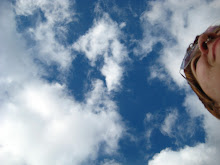Just days after 9/11anniversary, we are in amsterdam. a city with tolerance for everything except intolerance. on our second night, we are walking back towards our hostel, near centraal station. there are so many people in the street, so many languages, the background is chaotic and exciting. two voices are heard singing an unfamiliar tune and lyric. Hola! shouts a man as he passes us. Hola! Harvey shouts back. we intercept them as they slow down to meet us, two tan skinned men, one graying, one more baby faced. We exchange pleasantries and they ask us where we're from. San francisco, my collegue replies. "Ah, san francisco"! Where are you from? Spain? no, Italy? no. Israel! he replies. no, you don't have the right accent. "Iraq" is the final answer. Only for a moment, my brain states "woah". But in another moment, we see that they are friendly indeed. They introduce themselves (eventually) as Sale (pronounced sal-uh) and Muhammed. We ask them what they were singing; the reply was, "an old arabic tune, to which we've altered the words." I don't remember what the song used to be about, but the new words were something to the gist of "ali, why have you lied to us?"
Sale has been in Amsterdam for 9 years, working as a playwright and actor. He speaks fluent Dutch and Arabic, and only some english. Sale is extremely excited to learn that Harvey is also an actor, clown, and musician. Our new acquaintances convince her to sing a song. She chooses "a day in the life of a fool" and belts out a beautiful melody. I have heard Harvey sing many many times before, and again sat back to listen.
Muhammed has been living in the UK since he fled Iraq in 1996. He's a psychiatrist in Sheffield. He started off his introductions to us with the fact that a close friend had been killed in an explosion in Baghdad only a few months before. He, nearly laughing and close to tears, seemed to be at the edge of shock and grief. I tell him that I can only imagine such a tragedy.
Muhammed and Sale talk us into heading to a cafe (Dutch version of a bar) with them. As we walked, we discussed poetry - Muhammed is going through his grieving process by writing a poem together with a dear friend still in Baghdad. When we arrive and get drinks, he launches into another story about his return to Baghdad a year prior. Without telling his family or friends (except one), Muhammed books a flight for 2 weeks to Baghdad. He said he felt a sudden urge to go, and he had a pending sense of meeting what he thought was to be his own death. His family gets word of his arrival, and there is a tearful reunion at the airport. He then told of how he had not seen any of his family in ten years, and could not recognize his own brother.
His reunion with his family was extremely happy. About a week after his arrival, he meets up with an old friend who has since become a successful reporter in Baghdad. They make plans to meet the next day. Sale described how he phoned his friend many times the next day, and was finally contacted by another friend who told Muhammed that he was in a coma at the hospital. Muhammed only found out after he arrived at the hospital that the sucessful reporter was killed from a bomb explosion earlier that day.
I'm not too clear on what he mentioned next, but he described missing another explosion by 10 minutes as his brother was driving him to the airport. When he arrived, he found that all flights were canceled, but they did not recommend he travel home, as the road to the airport was unsafe and nicknamed the "way of death". Muhammed spent two nights in the airport and was finally able to return to Sheffield.
After this sad tale, the bar closes, and we're invited back to Sale's apartment (affectionately called Little Baghdad) to view a dvd of excerpts from a performance titled "Waar is Daar?" (Where is There?) It's a solo piece of words and dance, entirely in Dutch. Since Sale doesn't speak enough english to translate, he translates it from dutch to arabic, and Muhammed translates from Arabic to English for us. Basically, the play asks the questions, where have I come from, where am I going, and why am I tortured in both places? It's an interesting piece that incorporates bits of Iraqi and Dutch words and culture. We drink more beer while listening to traditional Iraqi music played on an ooud (sp?) which is a stringed instrument. Arabic music, like Indian music, does not operate on the western 12-tone scale. The result is that music is less concentrated on the note and more on the tone of the instrument. Meter is different too, being more relaxed and pulsing rather then metronomic.
Eventually, they ask us to stay with them. We decline, preferring the hostel. Fortunately they hail a cab for us so we can get home - it being very late and dark, we have no idea what part of town we're in. What shocks me is despite the fact that our home countries are still at war, they did not blame us or bash America for any wrongdoing. Had we each met in one of our parent countries, things would have been radically different.
Subscribe to:
Post Comments (Atom)

No comments:
Post a Comment